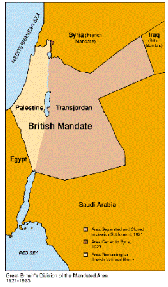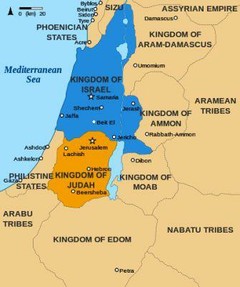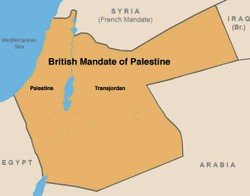The land of Israel has been referred to throughout history by various names: Canaan, the Southern Levant, Southern Syria and Palestine. The Hebrew word for Palestine appears in the Torah and refers to the strip of land on the southern coast of modern-day Israel, the first area the Philistines conquered when they came onto land from the Mediterranean.
The root of Philistine and Palestine in Hebrew is the same and it means, invader. It is not known where they are from, nor how they called themselves in their own language. It is unlikely that these are the forefathers of today's Arab Palestinians since they were probably not Semitic.
The Romans called this area, Syria Palestina, after having gained control of Judea and in order to cut the land off from its association with the Jewish people.
During World War I, the French and British had reached a secret deal for this division of the Middle East between them (the Sykes-Picot Agreement). With Turkey allied with Germany, the British promised the Arabs independence if they helped them, the British and French, defeat Turkey. But, the British also made a deal with the Jews to support their bid for a national homeland if, among other arrangements with world Jewry, the wealthy British Jews supported the British war effort (The Balfour Declaration). In other words, Jews would get Palestine if they helped the allies win the war against Germany. It must be emphasized that Palestine was never a country, but only the name given to the British Mandate over territory that was later divided up between Israel and Jordan. This fact must, of course, be kept separate from the fact that there was an Arab population living on the land who had the right to remain.
 When the Ottoman Empire was finally broken down by Turkey's losses in World War I, the League of Nations handed France a mandate over territories that are, today, Lebanon and Syria and a mandate to Britain over territories that are, today, Israel, the Palestinian territories, Jordan and Iraq. When it became clear to the Arabs that the British were not going to honour their promise to give them all the territories of the mandate (because the Arabs did not live up to their promise to the allies), they revolted against their Jewish neighbours and the British who they felt had double-crossed them.
When the Ottoman Empire was finally broken down by Turkey's losses in World War I, the League of Nations handed France a mandate over territories that are, today, Lebanon and Syria and a mandate to Britain over territories that are, today, Israel, the Palestinian territories, Jordan and Iraq. When it became clear to the Arabs that the British were not going to honour their promise to give them all the territories of the mandate (because the Arabs did not live up to their promise to the allies), they revolted against their Jewish neighbours and the British who they felt had double-crossed them.
It should be noted that the British promised the Jews a sovereign state only if their numbers exceeded those of the Arabs by the end of the war and protection if they did not.
Still the Arabs did not claim the name, Palestinians. In fact, the Jewish inhabitants were the Palestinians of that day. Their newspaper was called The Palestine Post (later changed to The Jerusalem Post).
Somehow the name "Palestinian" came to be associated only with Arabs. Their acceptance of this name is not unanimous and, I argue, it can even be humiliating. In this article I explain why.
Image Credit: Copyright American-Israeli Cooperative Enterprise, Reprinted with permission.






 It fell to the Assyrians (modern-time northern Iraq) in about 700 BCE. These 10 northern tribes were thus lost to history. This is also when the word, Jew, began to be applied to all remaining Israelites.
It fell to the Assyrians (modern-time northern Iraq) in about 700 BCE. These 10 northern tribes were thus lost to history. This is also when the word, Jew, began to be applied to all remaining Israelites.





 When the Ottoman Empire was finally broken down by Turkey's losses in World War I, the League of Nations handed France a mandate over territories that are, today, Lebanon and Syria and a mandate to Britain over territories that are, today, Israel, the Palestinian territories, Jordan and Iraq. When it became clear to the Arabs that the British were not going to honour their promise to give them all the territories of the mandate (because the Arabs did not live up to their promise to the allies), they revolted against their Jewish neighbours and the British who they felt had double-crossed them.
When the Ottoman Empire was finally broken down by Turkey's losses in World War I, the League of Nations handed France a mandate over territories that are, today, Lebanon and Syria and a mandate to Britain over territories that are, today, Israel, the Palestinian territories, Jordan and Iraq. When it became clear to the Arabs that the British were not going to honour their promise to give them all the territories of the mandate (because the Arabs did not live up to their promise to the allies), they revolted against their Jewish neighbours and the British who they felt had double-crossed them.







 Visiting an Art Gallery With a Two-Year-Oldon 07/27/2015
Visiting an Art Gallery With a Two-Year-Oldon 07/27/2015
 Using the News to Enhance Jewish Identity in Jewish Kidson 07/24/2015
Using the News to Enhance Jewish Identity in Jewish Kidson 07/24/2015
 Xi'an - Not Just Terracotta Warriorson 06/09/2015
Xi'an - Not Just Terracotta Warriorson 06/09/2015
 Sew Your Own Wedding Dress - or Your Daughter'son 02/06/2015
Sew Your Own Wedding Dress - or Your Daughter'son 02/06/2015



Comments
Thank you for the history lesson on Israel. Great reading.
@Brenda - When I look at our neighbours, it feels like we are an oasis here at the moment. But a very precarious oasis. Couldn't live anywhere else - this is home.
Sheri, This is a great informative article. I sometimes wonder how you can live there with all the turmoil. Although, it seems like every nation is in turmoil right now.
Thanks for approving my comment. I saw the second "NOT" and yet I still got KNOTTED UP with the word "subjective". That's only because the subject is a very sensitive one to us both. I would that people could be more objective in the approach to the peace solution. But because the matters are so close to the heart, it is very difficult. Nevertheless, I pray for peace.
Actually, I wrote: "I cannot NOT be subjective". I worried about whether the second "not" was clear enough and now I know it is not. Thanks, I will go back an emphasize it.
Thanks for your comment - I certainly hope we figure out how to make peace and then if your words come true, that would be even greater.
Mam, you begin your article by disclosing that you are Israeli and that you can not be subjective. I think you meant to say you can not be “objective”? I will have you know that there are very many non-Israeli people who also can not be objective. For the simple reason that to achieve peace between these two nations would shame all the other nations of the earth. There would be no more validation for war if these two groups of people could prove that peace was possible.
I think I know what you mean, Katie. Ridiculous is not a word I would use, given how much emotional energy is invested, not to mention lives. I think "sad" is the word I would use, but that's probably exactly what you mean, no? Thanks for reading and commenting.
It does seem ridiculous does it not???
Now there's an interesting idea!!
It is amazing, indeed.
It is amazing how someone chooses to fight some 1000 years old fights, instead of choosing peace, social and economical security. If not for their own good, but at least for well being of their children.
It would be the best if we could return to times of ancient Greece: one city = one state. I think that would satisfy everyone's desires. :)